Said and Done | In the Media + Awards | January 2019
A section of Said and Done
Full January 2019 edition
CLIMATE COMMUNICATION
"Reasonable doubt" on climate change is killing the planet | Thomas Levenson
"In essence, they're turning science against itself," Levenson writes of climate deniers. "They're treating climate researchers' willingness to acknowledge the limits of their findings — as all reputable scientists do — as evidence of lingering doubts that relieve us of any obligation to address the problem at all."
Editorial in the Boston Globe
How to teach climate science in coal country
"Coal is a part of West Virginians’ pride and identity and when coal is attacked, the individual also feels defensive," says MIT alumna Emily Calandrelli, who spoke at the National Energy Conference. "But West Virginians are patriotic and will see 'green' as the new 'red, white and blue,' understanding that dirty air endangers the purities that they cherish."
Story at Forbes
THE HUMANITIES | POWER SKILLS
DIGITAL HUMANITIES
Machine learning offers new tools, fresh insights for the humanities
Close reading of selected sources — the traditional method of historians — gives a deep but narrow view. Quantitative computational analysis has the potential to combine that kind of close reading with a broader, more generalized bird's-eye approach that might reveal hidden patterns or trends that otherwise might have escaped notice.
Commentary at Ars Technica
POWER SKILLS
Students, take that humanities course. We will all benefit.
Study in the humanities cultivates critical thinking, self-reflection, empathy, and tolerance, qualities and skills whose value becomes ever more apparent as we navigate life’s challenges. Recent studies also show that people with humanities degrees thrive in the workplace, experiencing low rates of unemployment and high levels of job satisfaction.
Commentary at The Washington Post
COMMUNITY PROFILE
KNIGHT SCIENCE JOURNALISM PROGRAM
A day in the life of Ashley Smart | Associate Director of KSJ
One of the perks of the job is that every Tuesday and Thursday evening we bring in a scientist or science journalist to talk to the fellows as part of our KSJ seminar series. I usually try to sit in on these, and they never disappoint. Back when I was a fellow myself, I got a ton of story ideas from them.
Profile at the Open Notebook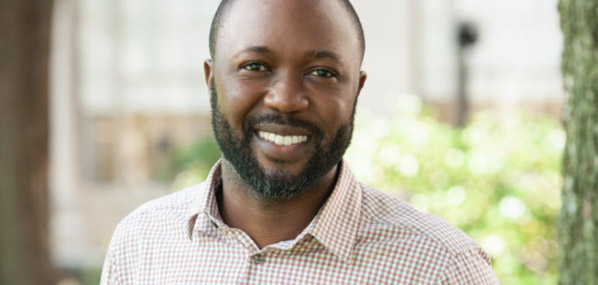
POLITICAL CONDITIONS
THE POLITICAL DIVIDE AND ECONOMICS
The key to understanding America's red-blue split is economics.
Alongside the decline of this old economy, a new, knowledge-based economy has arisen. This economy specializes in ideas — embodied in such goods as pharmaceuticals, semiconductors, movies, and software. MIT economist Peter Temin has dubbed this sector “FTE”: finance, technology, and electronics.
Analysis at The Washington Post
POLITICAL SCIENCE
Florida's recount is over, but worries about a 2020 election "meltdown" persist
"Florida did demonstrate in 2018 that they have shortcomings in election administration, but also illustrated ways in which Florida has improved in 2000," said Charles Stewart, the director of the MIT election data and science lab. "There are no stories of widespread failures on Election Day, and the problems that did emerge were not consequential in who ended up winning."
Coverage at NPR
POLITICAL SCIENCE
Voters have high tolerance for politicians who lie | Adam Berinksy
When the authors presented fact-checked assertions from Donald Trump and former Democratic presidential candidate Bernie Sanders to Americans, “the magnitude of the overall effect was minute,” even when false statements outweighed true ones by the same 4-to-1 margin.
Story at the LA Times
SECURITY STUDIES
Kim and Trump back at square one | Vipin Narang
“Kim seems to be saying outright that his patience is running thin at the continued insistence on unilateral disarmament,” Vipin Narang, an MIT professor who follows North Korea closely, wrote in an email. “The stick was the threat to go down a ‘new path' if the US doesn't reciprocate.”
Story at The New York Times
LITERATURE
Children's activism | Marah Gubar
"It isn’t enough to contest the authoritarian idea that children should be seen and not heard," says MIT literary scholar Marah Gubar. "We must also remember the ways in which children have challenged the status quo and changed the world as we know it."
Commentary in the LA Review of Books
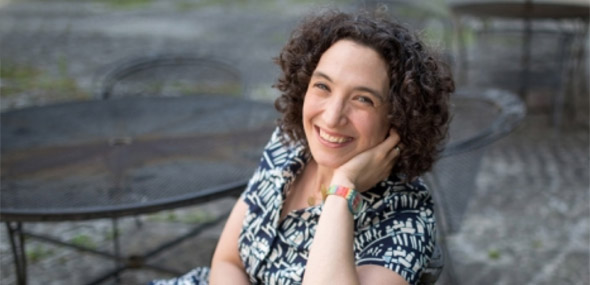
Marah Gubar, Associate Professor of Literature, Photo by Bryce Vickmark
TECHNOLOGY, AI, AND SOCIETY
AI AND THE FUTURE
Seeing our Future | David Mindell
"For driverless cars, it is a year of relaxing expectations, as makers struggle with robustness, safety, and human beings. The few “autonomous” cars on the streets drive, ironically, under the watchful eyes (and hands) of human drivers."
Commentary at Forbes
AI AND HUMAN SYSTEMS
Are home health aides the new Turing test for AI? | David Mindell
"Work is a rich, multidimensional human activity, embedding cognition and skills within webs of social and economic relationships. It’s also something that humanists and social scientists know a great deal about, knowledge that is rarely built into robotic or AI systems. In this era of anxiety about AI technologies changing the nature of work, everything we know about work should also change the nature of AI."
Commentary at Forbes
SCIENCE, TECHNOLOGY, AND SOCIETY
Why children's lives have changed radically in just a few decades
In rich countries the vast majority of 15-year-olds have their own smartphone and spend several hours a day online. There are growing concerns that overuse might lead to addiction and mental illness and a lack of healthy physical exercise.
Story at the Economist
TECH DEPENDENCY
Big tech may look troubled, but it's just getting started | David Autor
“Much as people are now wary or even unhappy with the outsized power held by Facebook, Google, Amazon, etc., they are simultaneously quite dependent on the services they provide.”
Story at The New York Times
COMPARATIVE MEDIA STUDIES
Fortnite is a social space the way skateparks and Facebook used to be | Eric Klopfer
Fortnite has been, for the most part, a friendlier place than many social platforms (even if there will always be bad actors online). At the beginning of a game, players are randomly assigned avatars of different genders and races to make it more inclusive.
Story at Quartz

Image: Fortnite avatars, via Quartz
ECONOMICS
TAX POLICY
Rep. Ocasio-Cortez’s 70 percent tax: The research and numbers behind the proposal
Institute Professor emeritus and Nobel laureate Peter Diamond says increasing the top marginal tax rate “will raise a lot of money that we could [use to] address some of our shortfalls and that will help us prepare for the large costs coming from climate change.” Diamond and MIT alumnus Emmanuel Saez relaunched this debate with a landmark 2012 paper that argues for a 73% top income tax rate in the US.
Story at WBUR | Story at Vox
HEALTH CARE ECONOMICS
Texas court strikes down ACA; health of Americans and democracy at risk
It has become clear that the law can survive in a weakened form without the mandate....And the vast majority of individuals buying insurance in the state exchanges are doing so with government-provided tax subsidies that cap the individual cost of insurance as a percentage of income. As a result, low income individuals in the exchanges are protected from rising premiums.
Editorial at The Boston Globe
EDUCATION ECONOMICS
Exploring school choice
MIT School Access and Quality Summit brings policymakers, educators, and researchers together to examine strategies and ways to measure effectiveness.
Story by MIT Open Learning
HEALTH CARE ECONOMICS
Misconceptions about health costs for elders
The big challenge in reducing end-of-life spending, highlighted by a recent study in Science, is that it is hard to know which patients are in their final year....“This shows that it's just very hard to know in advance who will die soon with much certainty,” said Amy Finkelstein, an MIT economist and an author of the study.
Story at The New York Times
DEFICIT POLICY
Does the deficit matter? | Olivier Blanchard
In a speech at this year’s American Economic Association conference, MIT’s Olivier Blanchard, one of the world’s most respected economists, argued that as long as economic growth outpaces bond yields, governments can run a deficit and keep rolling over their debt to increase society’s well-being. Other economists are hailing the speech as an important corrective.
Story at the New York Times | Blanchard's presentation, AEA Conference
CAN THE ECONOMIC DIVIDE BE REMEDIED?
How to narrow the economic divide
In this special report from Fortune, MIT's Esther Duflo and others offer compelling ideas for narrowing the economic divide.
Story at Fortune Magazine
THE ECONOMIC DIVIDE
Outlook dim for Americans without college degrees | David Autor
"The earnings of workers without a college education have scarcely risen in 50 years, after adjusting for inflation; for men they have fallen. This stagnation coincided with tectonic changes in American employment. Much of the production and office work that requires moderate training, which once employed vast numbers of workers without college degrees, has disappeared, either shipped abroad or offloaded on robots and computers. The resulting hardship has been implicated in a turn toward angry nationalism."
Autor's presentation | Stories at: NPR | The Economist | The New York Times

Image: Shutterstock/The Economist
ROBOTICS AND WORK
Robot reality check; they create wealth — and jobs | Daron Acemoglu
There are a number of reasons companies in the US don't use more robots, says Daron Acemoglu, a professor of economics at MIT. One is that the US hasn't had the same demographic pressures as Germany and Japan.
Commentary at Wall Street Journal
ROBOTICS AND WORK
The robots have descended on Trump country | Daron Acemoglu
In “Robots and Jobs: Evidence from U.S. Labor Markets,” MIT economist Acemoglu demonstrates that the Midwest and sections of the South have far higher ratios of robots to population than other regions of the United States.
Story at The New York Times
INVESTING IN PEOPLE
Podcast: What we now know about trade | David Autor
MIT economist Autor emphasizes the need for the U.S. to “invest in people,” adding, “if you want to share the gains broadly, and you want to limit the economic and potentially the political pain, you need to find a way to bring people along.”
Full story at Financial Times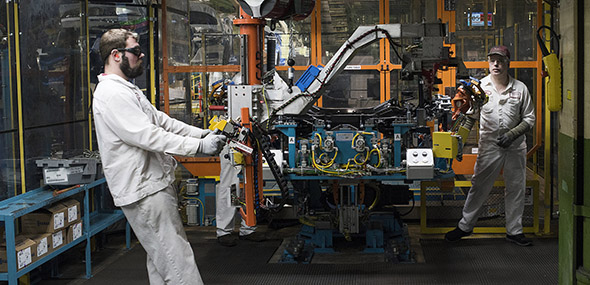
Humans and robot working together; Photo by Ty Wright/Bloomberg
THE ARTS | MUSIC AT MIT
Composer-in-chief | John Harbison
If John Harbison were an athlete, his 2018-19 season might be considered a “career year” for the award-winning composer and music educator. New commissions, world premieres of his compositions, and the publication of his first book, What Do We Make of Bach?, have created a whirlwind season for Harbison, who turned 80 in December 2018.
Story at Isthmus | Book: What Do We Make of Bach?
At 80, John Harbison continues to look ahead
By his own admission, John Harbison was never a composer who spent much time thinking retrospectively about his own legacy. “For many years, I took the attitude, and would counsel composers in general, to just go forward,” he said during a recent phone interview.
Profile at The Boston Globe
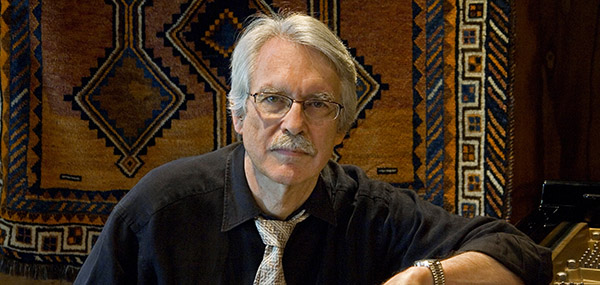
John Harbison, Institute Professor; photo by Tom Artin
"One project in the works is Sonata for Viola and Piano that Harbison is composing for Sally Chisholm, a professor of music and violist with the Pro Arte Quartet. 'The writing is brilliant,' says Chisholm, 'and that of a composer at the height of his power.'"
IN MEMORIUM
PHILOSOPHY
Sylvain Bromberger | He theorized about not knowing and he lived with it too.
An article on the remarkable life of Sylvain Bromberger (1924-2018), the MIT philosopher who investigated "the character of 'why' questions, in particular what makes them among the most obscure and puzzling questions we face."
The New York Times
WRITING
William Corbett | The King of Bohemia
Poet and critic Askold Melnyczuk remembers Bill Corbett (1942-2018) who taught in the MIT writing program for many years. Melnyczuk writes: "Attempting to describe my late friend to journalist Julia Lieblich, I stuttered a moment, then said: 'Why, he’s the king of Bohemia.'"
Tribute at Agni
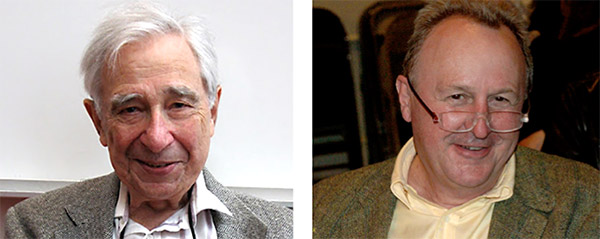
Left: Sylvain Bromberger (1924-2018); Right: William Corbett (1942-2018)
HONORS & AWARDS

ECONOMICS
The decade's eight best economists
Of the eight selected, two are MIT economics professors and five are MIT economics graduates. "Taken together, they display an impressive combination of clever empiricism and serious-minded wonkery. They represent much of what’s right with economics as well as the acumen of top American universities in scooping up talent."
Story at The Economist
MUSIC AND THEATER ARTS
Ken Urban awarded Tishman Playwrights Creativity prize from New Dramatists
The prize will support the development of Urban's new play "Danger and Opportunity," a comedy about a married gay couple who decide to get romantically involved with an ex-girlfriend.
More about Ken Urban's work
A section of Said and Done
Full January 2019 edition
STAY IN TOUCH
Follow us
![]()
![]()
Research Impact
Explore
SHASS on MIT News
Research, Features, Awards
MIT Campaign for a Better World
Story | Join Us
Videos
Watch
Said and Done is published by SHASS Communications
Office of the Dean, MIT School of Humanities, Arts, and Social Sciences
Published 17 January 2019


